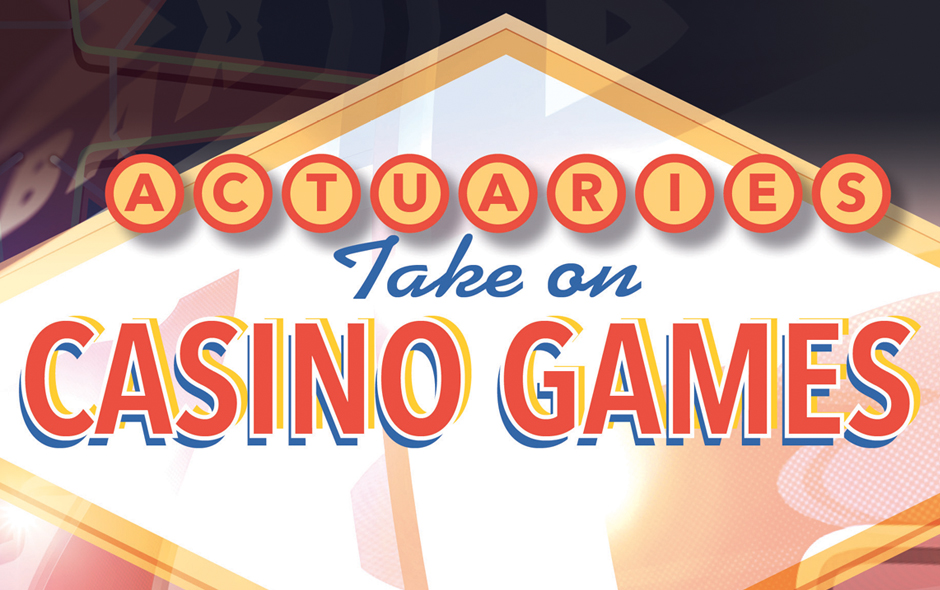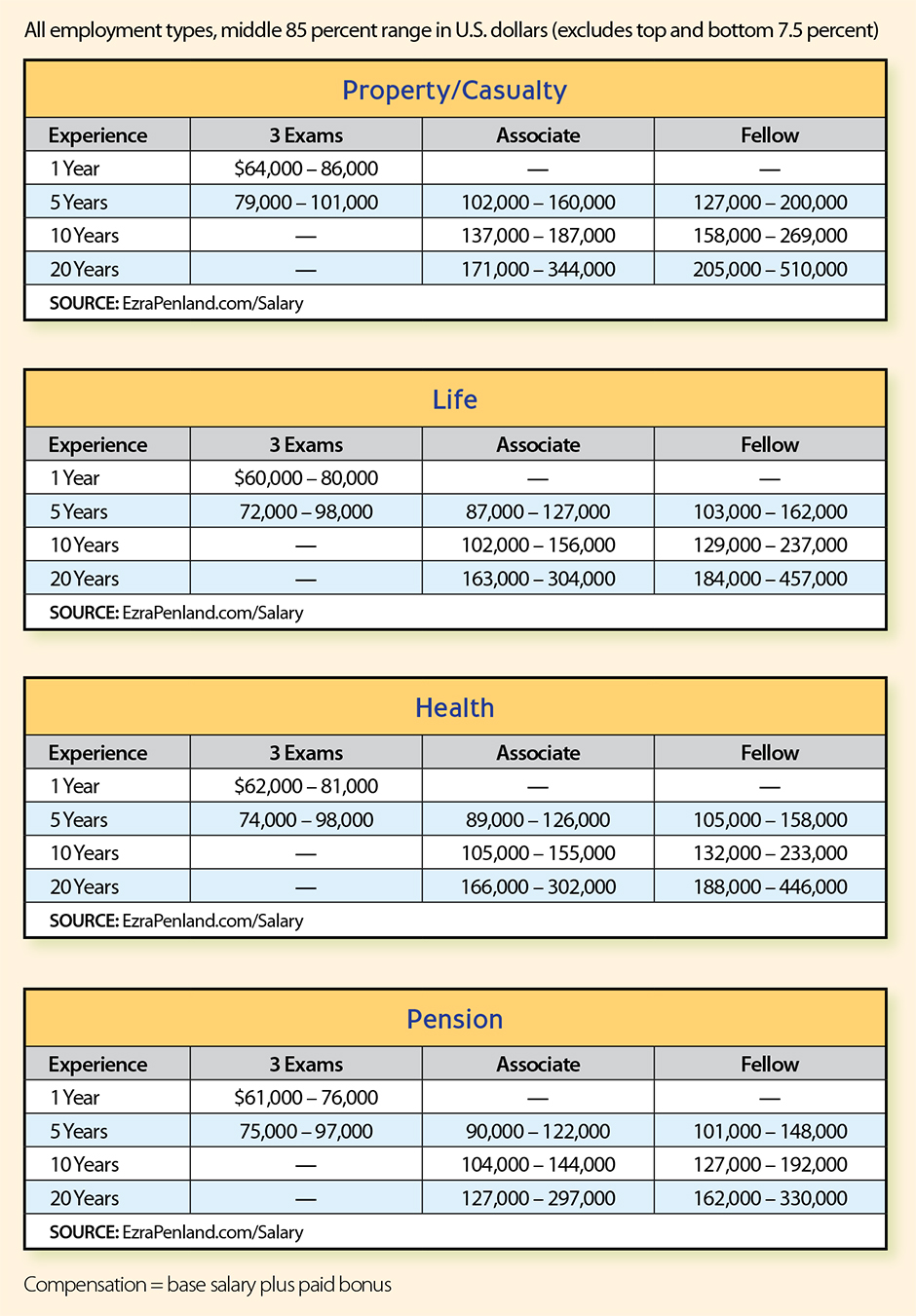
Daniel Lee, who hopes earn his ASA designation soon, and Bradley Baker, ASA, are Canadian actuaries who work on casino games for the Canadian Bank Note Company.
Claude Penland interviewed them for Contingencies’ Job Seeker supplement.
Why did you decide to be an actuary?
Like most actuaries, a love for mathematics and statistics drew us to the profession. Being an actuary is a great way to put our analytical skills to work solving interesting and challenging problems.
How does what you do now fit in to what you do/did as an actuary?
Prior to joining the gaming world, we were both pension actuaries at a large consulting firm. There is a surprisingly large amount of overlap in the technical work we did as pension actuaries and in the work we do as gaming actuaries. For one, many of the mathematical skills that are required to perform a pension valuation apply to building and validating the math models of a game. From an exam perspective, pension actuaries will find that life contingencies are most present in their work, while gaming actuaries will find Exam C to be of paramount importance to their work.
What did you learn as an actuary that helps you now?
Most importantly, the actuarial exams provided us with the necessary skills to build and validate the mathematical models behind our games. The upper-level actuarial exams place an important emphasis on using credible data and setting reasonable and appropriate assumptions, which has proved very helpful in our work as gaming actuaries. The actuarial control cycle that actuaries are introduced to in the Fundamentals of Actuarial Practice modules provides a perfect framework for the models that we create for our games. The rigor that is expected in traditional actuarial work also is required in the gaming sphere. The work of pension actuaries often is subject to review by a regulator, and the same is true for the work we do in gaming.
What mathematical studies in college do you recommend for people who want to get into what you do or other nontraditional outlets?
In our opinion, studying actuarial science will prepare you well for a career as a gaming actuary. Take as many mathematics, probability, statistics, and programming courses as you can. A few courses in corporate finance and economics also will be useful.
What are your plans for the future?
There are very few actuaries in this space, and we hope to have a long career as gaming actuaries. As the industry evolves, there is an expectation that games will become progressively more complex. New slot machine games are beginning to incorporate elements of skill that require well-thought-out assumptions and stochastic modeling. The mathematical models supporting games are becoming more and more difficult to solve. Ultimately, we hope to be pioneering a new field for the actuarial profession.
Please take me through a couple of real-life scenarios—challenging gambling-related things that you and Bradley have had to work through.
Our day-to-day work requires us to build mathematical models for a particular electronic or lottery game based on a concept approved by our Creative Committee and to monitor actual results gathered from the field that we use to validate our models. Sometimes actual results can deviate from expected results. This can be a result of three events: chance, an error in the programming of the game or the mathematical model, or our players have found a way to compromise the game. Credibility theory helps us quantify the likelihood that unexpected results are a result of chance. Errors in programming or mathematical models can occur as a result of differing interpretations of the game rules; we try to catch these errors by running large simulations of both our simulation code and the actual game code. Players finding a way to compromise our games can be extremely dangerous to our company’s bottom line; our best bet at minimizing losses is to keep a close eye on the results and to act as soon as we have credible data.
Are there other professionals who you’ve learned from while working as a gaming mathematician?
We work closely with gaming lawyers who help us avoid patent infringement when we design our games. So much of new games is borrowed from older games, and it can be challenging to tell what is in the public domain and what is copyrighted. We also work closely with our CFO and marketing experts to ensure that the performance of our games is meeting our net win targets.
What other backgrounds do gaming mathematicians come from?
Most gaming mathematicians do not have an actuarial background. The vast majority of gaming mathematicians have degrees in math or statistics.
Any plans to move to the United States—to Las Vegas or Atlantic City—or overseas to someplace like Macao?
While we recognize that the epicenter of gaming math currently is in Las Vegas, we have no plans to relocate there. In the last few decades, gaming has spread across the world, with most of us now living in areas with government lotteries or within an hour’s drive of a casino. The Canadian Bank Note Company currently is growing its gaming portfolio both in Canada and internationally, which gives us an opportunity to be a part of this growth.
What is your impression of the supply and demand of gaming professionals?
There is an increasing demand for people with strong analytical skills, coding skills, and a passion for games. In our opinion, actuaries are perfectly suited to lead the next generation of gaming innovation.
Is it fun?
It is incredibly fun! We sometimes forget that we are at work. We work with various games all day and we are encouraged to play at work. Daniel has three slot machines in his office!
Is this a growth area?
Gaming is in a strong growth phase right now, especially internationally. The community of gaming mathematicians is small but growing. Three years ago, there were no gaming mathematicians in Ottawa, Canada, a city of about 1 million people.
Is it easier or harder to describe what you do to people than when you described actuarial work?
We find it easier to describe what we do as gaming actuaries than what we did when we were pension actuaries. Most people have been exposed to gaming in some form, either through interacting with a slot machine or a table game at a casino, buying a lottery ticket, or playing card games at family gatherings. It was a bit harder to get people to relate to the work we did as pension actuaries. Most people find what we do fascinating.
Do you manage anyone? Is there the potential for management/mentoring in the future?
When it comes to creating and validating the mathematical models for our games, we are currently a team of two, but we expect this to grow in the future. However, we also contribute to other areas beyond math; for example, we provide input in the graphical design of our games, where we work with a larger team. Bradley is the chair of our Creative Committee, which determines which new game concepts will be implemented.
What continuing studies do you plan to focus on?
Daniel plans to complete his ASA this year, and Bradley his FSA. After that, we expect to deepen our knowledge of programming languages, such as C++ and R, to increase the number of simulations we can perform in a day. We also plan to continue to expand our knowledge of probability and game theory. For continuing education, we rely heavily on the University of Nevada, Las Vegas’ gaming math department, which publishes studies and papers.
Are there any periodicals or other news that you have to keep up with in the gaming area?
There are many periodicals that keep us up to date on gaming. We both subscribe to Casino Journal. Daniel also attends the annual Global Gaming Expo in Las Vegas, which features important educational sessions.
Could actuaries write to you if they have additional questions?
Absolutely. Daniel can be reached at dlee@cbnco.com and Bradley at bbaker@cbnco.com.
After gaming mathematics, what’s next?
Gaming mathematics is constantly evolving, so it likely will keep us engaged for years to come.
Is there anything that I haven’t covered that you’d like to discuss?
We hope this article leads other actuaries to consider making the switch to gaming. It is a fun and exciting field to be a part of, and actuaries have the right mix of analytical and business skills to become leaders in this field.
CLAUDE PENLAND, MAAA, ACAS, is a partner with Ezra Penland Actuarial Recruitment.
U.S. Actuarial Compensation
Are you getting paid what you’re worth? These surveys, compiled by Claude Penland of Ezra Penland Actuarial Recruitment, offer a snapshot of 2017 compensation in the life, property/casualty, health, and pension fields.





